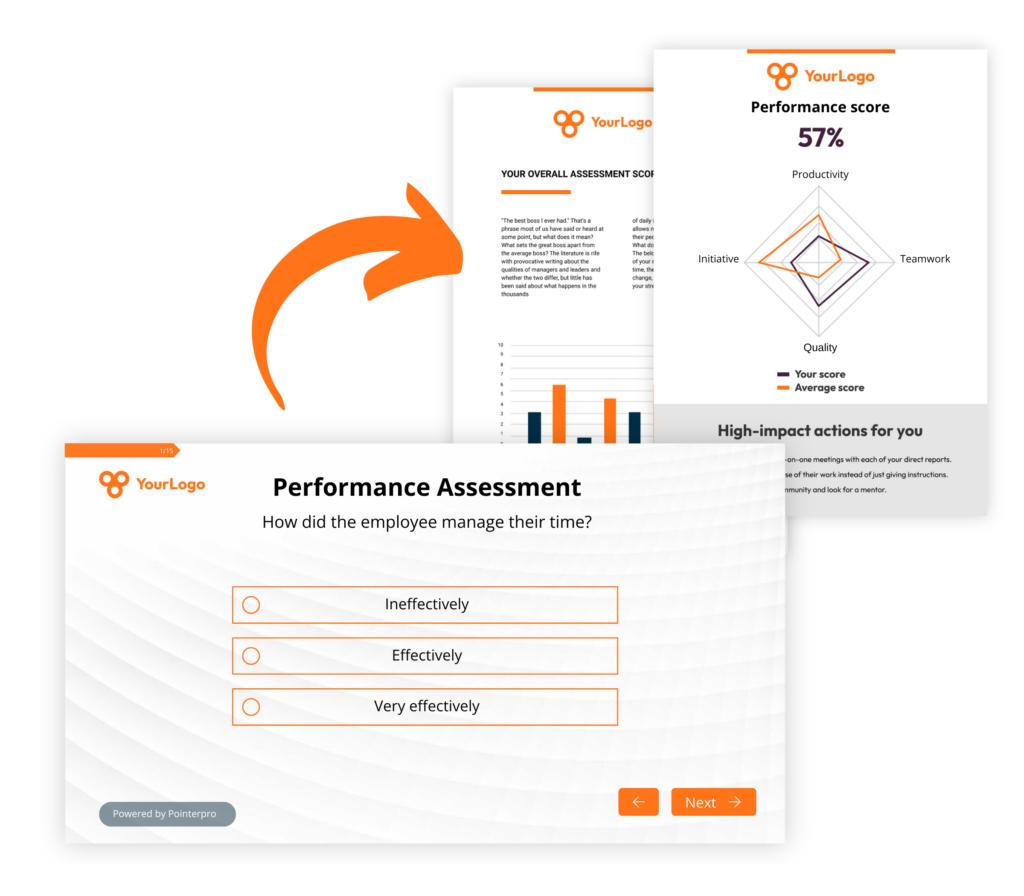Performance assessment template
The way you assess employee performance should be based on a solid and consistent methodology. That’s why you HR specialists develop their own performance assessment template.
Providing employees with actionable, personalized feedback is their ideal standard operating procedure.
Pointerpro is the 2-in-1 software that combines assessment building with personalized PDF report generation.

What are the key aspects of a performance assessment?
A performance assessment evaluates an employee’s effectiveness in their role and their contribution to the success the organization they work for.
The key aspects of a well-rounded performance assessment should cover – according to many HR experts – are productivity, quality, initiative, teamwork, and problem-solving.
These dimensions offer a comprehensive view of an individual’s capabilities. It’s important to distinguish capabilities from potential. If an assessee shows capability, that means they have brought added value to the table.
Here’s how each of these aspects is essential across various domains:
- Productivity measures how efficiently tasks are completed within a set timeframe. It reflects the ability to meet goals and handle workloads effectively, making it a critical indicator of performance across all domains.
- Quality assesses the accuracy and standard of work produced. High-quality outputs are essential in every field, as they lead to better outcomes, fewer errors, and higher customer or stakeholder satisfaction.
- Initiative refers to taking independent action and going beyond basic job requirements. It shows an employee's ability to innovate, take ownership, and proactively seek improvements, which is vital in dynamic and competitive environments.
- Teamwork measures how well an individual collaborates with others to achieve shared goals. It is crucial for ensuring smooth communication, effective coordination, and stronger collective outcomes in any organization.
- Problem-solving evaluates how effectively an employee identifies, analyzes, and resolves issues. This skill is indispensable across all roles, as it minimizes disruptions and ensures the continuous improvement of processes.
We’ll dive into how cover these when you build a questionnaire-based assessment and you’ll discover how you can get from a performance assessment to a personalized, actionable feedback report for each employee.
3 reasons to use Pointerpro as a performance assessment tool
3 reasons to use Pointerpro as a performance assessment tool
Interactive user experience
With the Questionnaire Builder you get to create an engaging assessment. How? With numerous design and layout options, useful widgets and countless question types.
Refined, score-based analysis
Our custom scoring engine helps you score different categories of the employee performance review. The result? An objective and nuanced assessment.
Automated feedback in PDF
Thanks to your setup in the Report Builder, respondents instantly get a detailed PDF report: with helpful charts, a personalized analysis, and actionable tips.
1.500+ businesses worldwide build assessments with Pointerpro









How to properly evaluate each key aspect in your performance assessment
When building a questionnaire with a performance assessment tool, be sure to use one that integrates custom scoring features. This allows you to tailor the evaluation process to the specific needs of your organization.
Here’s what it comes down to: Custom scoring involves assigning weighted scores to different questions or criteria. It therefore provides your assessment with a more nuanced and accurate evaluation of key performance aspects.
Pointerpro’s Product Director Bruno explains the principle of custom scoring in layman’s terms below:
Let’s assume the aspects you’ll focus on are indeed the ones we’ve listed before. In the organization you’re doing the assessment for, possibly certain aspects are of higher-priority than others. With custom scoring, you’re able to attribute more weight to the related questions.
Here are some sample guidelines on how to properly evaluate each key aspect:
Productivity
- Evaluation focus: Measure the efficiency with which tasks are completed within given timeframes.
- Sample question: How often does the employee complete tasks within the expected time?
- Scoring: Use a scale (e.g., 1-5) to evaluate timeliness, with custom weight based on how critical speed is for the role.
Quality
- Evaluation focus: Assess the accuracy and standard of work relative to expected benchmarks.
- Sample question: How frequently does the employee produce error-free work?
- Scoring: Assign a score based on error rates or quality reviews, with higher weight for roles requiring precision.
Initiative
- Evaluation focus: Gauge the employee’s ability to take independent actions and suggest improvements.
- Sample question: How often does the employee suggest new ideas or improvements?
- Scoring: Apply a weighted score based on how proactive behaviors contribute to the team or organization.
Teamwork
- Evaluation focus: Evaluate how well the employee collaborates with others to achieve shared goals
- Sample question: How effectively does the employee contribute to team projects?
- Scoring: Score based on peer feedback or observed collaboration, with customizable weight depending on the role’s teamwork demands. This implies you’ll use a 360 approach to your assessment. In other words, to gather input from peers about an employee, you distribute a peer performance assessment. You can then collect the findings and formulate the feedback in aggregate reports.
The 360 approach to performance assessment explained by Pointerpro’s very own Stacy Demes:
Problem-solving
- Evaluation focus: Assess the employee’s ability to identify, analyze, and resolve issues efficiently.
- Sample question: How well does the employee handle unexpected challenges in their role?
- Scoring: Customize the score based on how critical problem-solving is in the role, emphasizing effectiveness and innovation.
Performance assessment vs self-assessment performance reviews
Both assessments by managers or peers and self-assessment in performance review are valuable tools to evaluate an employee’s contributions. Just bear in mind how they differ in perspective and application:
- Performance assessment involves external evaluation. It tends to be more formal and focused on how well an employee meets organizational goals - from the perspective of someone who is in the position to gauge this. Questions tend to relate to key performance indicators, and expectations that were formally expressed in an earlier stage. In other words, it provides an objective measure of an employee’s performance, often based on predefined criteria and external feedback.
- Self-assessment of performance is when the employee evaluates their own performance. This allows individuals to reflect on their strengths, areas for improvement, and overall contribution. Self-assessment encourages accountability, self-awareness, and active participation in professional development. However, it can sometimes be biased, either overly critical or inflated, depending on the employee’s self-perception.
Evaluating an employee is complex and a correct evaluation requires a broad perspective. It’s beneficial for any organization to develop performance assessment templates that can be completed by different stakeholders.
30 performance assessment example questions
Here are 30 of the best performance assessment example questions divided into 3 categories:
- 10 yearly performance assessment example questions
- 10 quarterly performance assessment example questions
- 10 project-specific performance assessment example questions
10 yearly performance assessment example questions
- How well did the employee meet their annual productivity goals?
- Did the employee consistently deliver high-quality work throughout the year?
- How often did the employee take initiative in suggesting or implementing improvements?
- How effectively did the employee collaborate with colleagues and contribute to team success?
- How well did the employee resolve complex challenges that arose during the year?
- How frequently did the employee meet important deadlines and stay on schedule?
- To what extent did the employee demonstrate growth in skills or knowledge over the year?
- How well did the employee adapt to changes in priorities or processes?
- How consistently did the employee seek feedback and apply it to improve their performance?
- Did the employee effectively manage their time and resources throughout the year?
These yearly performance assessments template questions take into account long-term goals, cumulative achievements, and overall growth.
The questions target broad aspects like productivity, quality of work, skill development, and adaptability. Using diverse answer formats (e.g., Likert scales, multiple choice, ratings), employers can capture nuanced feedback. The yearly approach emphasizes long-term performance trends, which is ideal for tracking career growth and making key decisions around promotions or development opportunities.
10 quarterly performance assessment example questions
- How well did the employee meet their short-term objectives this quarter?
- Was the employee's work quality consistent over the last three months?
- How often did the employee take initiative in this quarter’s tasks?
- How well did the employee contribute to team goals this quarter?
- Did the employee successfully address any specific challenges during this quarter?
- How effectively did the employee manage their workload and deadlines this quarter?
- Did the employee show progress in learning or improving skills in the last three months?
- How well did the employee respond to feedback provided during this quarter?
- How adaptable was the employee to any changes or new priorities this quarter?
- To what extent did the employee contribute to meeting the team's overall goals this quarter?
Quarterly performance assessments provide a more frequent and focused evaluation of an employee’s performance, typically covering three-month periods. These performance assessment template questions emphasize short-term goals, adaptability, and immediate contributions, offering managers a quicker feedback loop to address performance issues or recognize achievements early on. It often uses the same performance categories as yearly assessments but with a sharper focus on recent outcomes and adjustments to shorter-term priorities.
The key difference between quarterly and yearly assessments is the emphasis on immediate performance trends and tactical feedback, which allows for more agility in making performance adjustments.
10 project-specific performance assessment example questions
- How well did the employee contribute to achieving the project’s objectives?
- Did the employee deliver high-quality work during this project?
- How effectively did the employee take initiative in resolving project-specific challenges?
- How well did the employee collaborate with team members throughout the project?
- Did the employee help in successfully overcoming key project roadblocks?
- How well did the employee manage project deadlines and deliverables?
- Did the employee apply any new skills or knowledge specifically for this project?
- How adaptable was the employee when project priorities or timelines shifted?
- Did the employee provide useful feedback or suggestions that improved the project outcome?
- How well did the employee balance their responsibilities for this project with other tasks?
Project-specific performance assessments evaluate an employee’s contribution to a specific project or initiative, focusing solely on their performance during that particular period. This type of assessment is ideal for roles where work is heavily project-based, as it allows for detailed insights into the employee’s role in delivering project goals, handling challenges, and collaborating with others.
Unlike yearly or quarterly assessments, which evaluate broader performance trends, project-specific assessments zoom in on individual contributions and successes directly related to one project. These assessments are typically more immediate, tied directly to project outcomes, and offer direct feedback on the impact of specific efforts.
What Pointerpro clients are saying




Do’s and don’ts of an online performance assessment
There are several important do’s and don’ts when conducting online performance assessments through questionnaires. The following guidelines can help ensure the assessment is effective, reliable, and constructive.
Performance assessment do’s
- Do keep questions clear and concise: Use straightforward language and avoid jargon to ensure all respondents understand the questions.
- Do use a variety of question types: Incorporate different formats (e.g., multiple choice, Likert scales, open-ended questions) to capture diverse insights and make the assessment more engaging.
- Do provide context: Briefly explain the purpose of the assessment and how the feedback will be used. This can enhance respondent engagement and encourage honest feedback.
- Do ensure anonymity and confidentiality: If possible, allow respondents to answer anonymously to promote honesty and reduce bias in responses.
- Do pilot test the questionnaire: Test the questionnaire with a small group before full deployment to identify any confusing questions or technical issues.
- Do set a clear deadline: Communicate a specific timeframe for completion to ensure timely feedback and responses.
- Do follow up: After the assessment, share the results with respondents and discuss how their feedback will be integrated into performance evaluations or improvements.
- Do use a user-friendly platform: Choose a platform that is intuitive and accessible to all users, ensuring a smooth experience for respondents.
- Do provide instructions: Include clear instructions on how to complete the questionnaire and how long it should take to finish.
- Do encourage constructive feedback: Frame questions in a way that promotes constructive criticism and focuses on growth rather than just evaluation.
Performance assessment don’ts
- Don’t overload with questions: Avoid making the questionnaire too lengthy; it can lead to respondent fatigue and reduce the quality of answers.
- Don’t use leading or biased questions: Ensure that questions are neutral and do not steer respondents toward a specific answer.
- Don’t ignore technical issues: Test for potential technical problems (e.g., broken links, compatibility issues) to ensure a smooth user experience.
- Don’t skip rating scales: Avoid yes/no questions alone; use rating scales or Likert scales to capture the intensity of opinions.
- Don’t forget to follow up on results: Failing to communicate how the feedback will be used can lead to disengagement in future assessments.
- Don’t neglect accessibility: Ensure that the questionnaire is accessible to all individuals, including those with disabilities (e.g., use compatible formats for screen readers).
- Don’t use complex terminology: Avoid jargon or technical terms that may confuse respondents; simplicity is key.
- Don’t make it impersonal: Personalize the experience where possible (e.g., use the respondent’s name), as it can increase engagement and the likelihood of completion.
- Don’t ignore the importance of training: Ensure that those administering the assessment understand its purpose and how to interpret the results effectively.
- Don’t rush the process: Give adequate time for respondents to reflect on their answers, ensuring thoughtful and accurate feedback
How to keep an online performance assessment (self-assessment) personal
Keeping an online performance assessment personal can enhance engagement and encourage honest feedback. Here are several strategies to achieve this:
- Use personalized communication: Begin the assessment with a personalized greeting that includes the respondent's name. This small touch can make participants feel valued and recognized as individuals rather than just numbers.
- Tailor questions to individual roles: Customize the questionnaire to reflect the specific responsibilities and challenges of each employee's role. This ensures that the questions are relevant and meaningful, prompting respondents to reflect on their unique experiences.
- Incorporate some open-ended questions: Include open-ended questions that allow respondents to express their thoughts and feelings in their own words. This can provide richer insights and make the assessment feel more like a conversation rather than a checklist.
- Acknowledge individual achievements: Incorporate questions that prompt employees to reflect on their own successes and contributions. For example, ask them to highlight a project they are proud of or a challenge they overcame.
- Use a conversational tone: Craft questions in a friendly, conversational tone rather than formal language. This approach can make the assessment feel less intimidating and more approachable.
- Encourage reflection on personal goals: Include questions that prompt respondents to think about their personal and professional development goals. This not only makes the assessment more relevant but also emphasizes the organization’s investment in their growth.
- Use visuals and personalization features: If the platform allows, use visuals, such as the employee’s photo or achievements, to personalize the assessment experience. This can create a sense of connection and recognition.
By incorporating these strategies, organizations foster a more personal and engaging performance assessment experience. When employees feel valued and understood, they are more likely to provide thoughtful feedback and engage in the process.
One last tip to emphasize: Follow up with personal feedback.
After the assessment, provide personalized feedback based on the responses. This could include recognizing achievements, discussing areas for growth, and setting tailored development goals.
This feedback can be processed into a personal development report. A few important thoughts on the use of such a report by our colleague, Stacy:
The performance assessment template report: 6 key tips
- Highlight strengths and achievements: Begin the report by acknowledging the individual’s strengths and notable achievements. This sets a positive tone and reinforces confidence, encouraging the employee to engage constructively with the feedback.
- Provide specific examples: Use concrete examples from the questionnaire responses to illustrate points. Try to visualize findings with charts to make things tangible. Including benchmark data in this type of feedback is also highly valuable Specificity makes the feedback more relatable and actionable, allowing the employee to understand exactly what they did well or where improvement is needed.
- Offer constructive recommendations: Alongside areas for improvement, provide clear and actionable recommendations for development. Frame these suggestions positively, focusing on growth opportunities rather than just highlighting weaknesses.
- Use a balanced approach: Ensure that the report maintains a balance between positive feedback and constructive criticism. This helps create a sense of fairness and encourages openness to feedback, making it easier for the employee to accept and act on the suggestions.
- Include goal-setting and next steps: Encourage the employee to set personal development goals based on the feedback. Include a section for them to outline specific actions they will take, fostering a proactive approach to their growth and reinforcing accountability for their own development.
By implementing these tips, the personalized feedback reports can become valuable tools for enhancing employee engagement and performance, leading to a more effective development process.
Create your performance assessment now
You may also be interested in
Recommended reading

How Connections In Mind benefits the community interest through a digital mindset and a longitudinal assessment
The fact that communities benefit from diversity should not be news to anybody. One type of diversity you may not

Vlerick Business School digitalizes entrepreneurship development with Pointerpro [case study]
What do a top-tier international business school based in the capital of Europe and Pointerpro have in common? At the

Attain Global: How to do psychometric tests right and build a cutting-edge international business [case study]
In many countries worldwide, the pursuit of skillful and engaged employees is not so much a war on talent as


